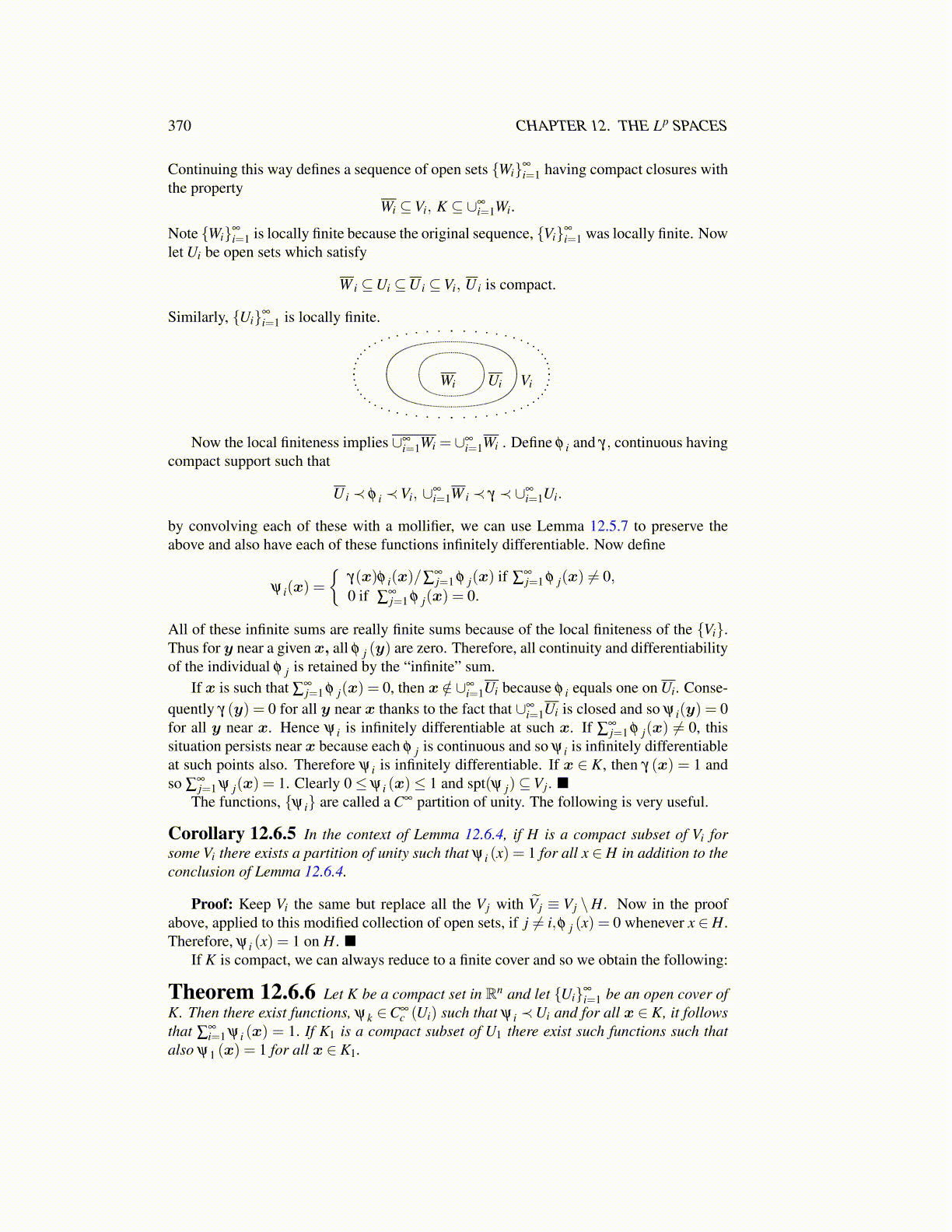
370 CHAPTER 12. THE Lp SPACES
Continuing this way defines a sequence of open sets {Wi}∞
i=1 having compact closures withthe property
Wi ⊆Vi, K ⊆ ∪∞i=1Wi.
Note {Wi}∞
i=1 is locally finite because the original sequence, {Vi}∞
i=1 was locally finite. Nowlet Ui be open sets which satisfy
W i ⊆Ui ⊆U i ⊆Vi, U i is compact.
Similarly, {Ui}∞
i=1 is locally finite.
Wi Ui Vi
Now the local finiteness implies ∪∞i=1Wi = ∪∞
i=1Wi . Define φ i and γ, continuous havingcompact support such that
U i ≺ φ i ≺Vi, ∪∞i=1W i ≺ γ ≺ ∪∞
i=1Ui.
by convolving each of these with a mollifier, we can use Lemma 12.5.7 to preserve theabove and also have each of these functions infinitely differentiable. Now define
ψ i(x) =
{γ(x)φ i(x)/∑
∞j=1 φ j(x) if ∑
∞j=1 φ j(x) ̸= 0,
0 if ∑∞j=1 φ j(x) = 0.
All of these infinite sums are really finite sums because of the local finiteness of the {Vi}.Thus for y near a given x, all φ j (y) are zero. Therefore, all continuity and differentiabilityof the individual φ j is retained by the “infinite” sum.
If x is such that ∑∞j=1 φ j(x) = 0, then x /∈ ∪∞
i=1Ui because φ i equals one on Ui. Conse-quently γ (y) = 0 for all y near x thanks to the fact that ∪∞
i=1Ui is closed and so ψ i(y) = 0for all y near x. Hence ψ i is infinitely differentiable at such x. If ∑
∞j=1 φ j(x) ̸= 0, this
situation persists near x because each φ j is continuous and so ψ i is infinitely differentiableat such points also. Therefore ψ i is infinitely differentiable. If x ∈ K, then γ (x) = 1 andso ∑
∞j=1 ψ j(x) = 1. Clearly 0≤ ψ i (x)≤ 1 and spt(ψ j)⊆Vj. ■
The functions, {ψ i} are called a C∞ partition of unity. The following is very useful.
Corollary 12.6.5 In the context of Lemma 12.6.4, if H is a compact subset of Vi forsome Vi there exists a partition of unity such that ψ i (x) = 1 for all x ∈ H in addition to theconclusion of Lemma 12.6.4.
Proof: Keep Vi the same but replace all the Vj with Ṽj ≡ Vj \H. Now in the proofabove, applied to this modified collection of open sets, if j ̸= i,φ j (x) = 0 whenever x ∈H.Therefore, ψ i (x) = 1 on H. ■
If K is compact, we can always reduce to a finite cover and so we obtain the following:
Theorem 12.6.6 Let K be a compact set in Rn and let {Ui}∞
i=1 be an open cover ofK. Then there exist functions, ψk ∈C∞
c (Ui) such that ψ i ≺Ui and for all x ∈ K, it followsthat ∑
∞i=1 ψ i (x) = 1. If K1 is a compact subset of U1 there exist such functions such that
also ψ1 (x) = 1 for all x ∈ K1.